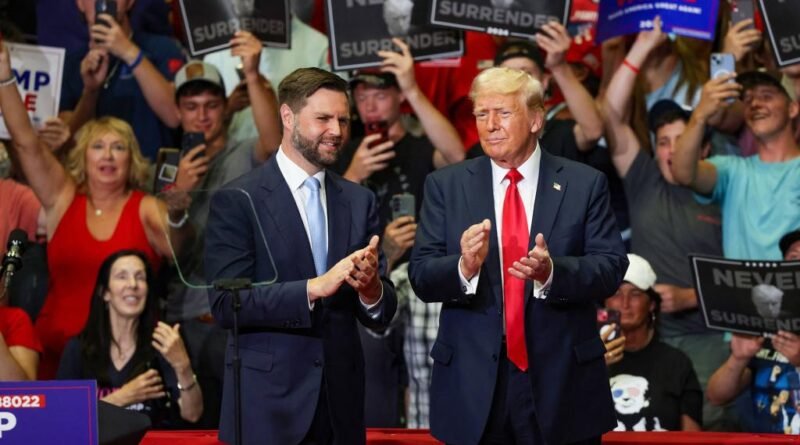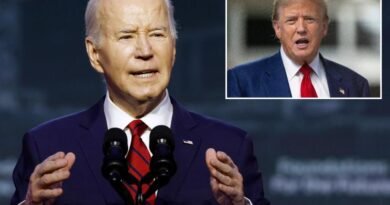Trump and Vance’s commitment to military realism offers Ukraine hope, not isolationism.

Since the end of World War II, debates about American foreign policy have more often been within the two major parties than between them.
In the early stages of the Cold War, Republicans and Democrats did not fundamentally disagree on the need to contain the ideological contagion and expansionist imperialism of the Soviet Union.
Most of the debates between the parties were about the mechanics of containment. The intraparty debates were much more bitter, as when the Republicans had to snuff out McCarthyism.
As they agonized over Vietnam, Republicans and Democrats mostly agreed on the need to get involved and then, after 1967, mostly agreed on the need to get out.
The real debate was within the Democratic Party, between an establishment that mostly went along with the hope of “peace with honor” and a younger faction that sided with the anti-war protests of the radical left.
Post-9/11 crossroads
In the same way, there was a remarkable bipartisan consensus after the 9/11 attacks that military action needed to be taken against not only the government of Afghanistan but also the government of Iraq.
Only when things went wrong in Iraq did leading Democrats distance themselves from the neoconservative project.
The bipartisan consensus in favor of imposing tariffs and technological restrictions on China is just the latest example. On most big foreign policy questions, the leaders of the major parties tend toward groupthink.
Thus the biggest debate on foreign policy we have seen in recent years is the debate within the Republican Party over the wisdom of supporting Ukraine in its war against Russia.
There are few truths more widely acknowledged in Europe today than that the Ukrainian government of Volodymyr Zelensky would be among the biggest losers if Donald Trump were to be reelected president on Nov. 5.
I heard it said at the World Economic Forum and I heard it again at the Munich Security Conference.
To most western European leaders, with the notable exception of the Hungarian Prime Minister Viktor Orbán, the news that JD Vance had been picked to be Trump’s running mate was disastrous.
Did not Vance once say that he “didn’t care” what happens in Ukraine?
It was in an interview with Trump’s adviser, Steve Bannon, just five days before Russia’s full-scale invasion of Ukraine, that Vance said: “I don’t really care what happens to Ukraine, one way or the other.”
He went on: “We did not serve in the Marine Corps to go and fight Vladimir Putin because he didn’t believe in transgender rights, which is what the US State Department is saying is a major problem with Russia.”
Even after the invasion, Vance’s position was ambivalent: “Putin is an evil man,” he said, “but the foreign policy establishment that led Ukraine directly into the slaughterhouse deserves nothing but scorn.”
In the subsequent 2½ years, Vance has consistently aligned himself with those elements of the Republican Party and MAGA movement who cast aspersions on the Ukrainian government’s honesty and portray Vladimir Putin’s cause as in some sense a justified retaliation for NATO expansion.
No isolationist ticket
Yet it would be a mistake to assume that Trump’s choice of Vance represents a victory for the isolationists and Putin apologists (step forward, Tucker Carlson).
Consider what Vance told The New York Times in an interview with Ross Douthat last month.
First, he argued that weapons being sent to Ukraine were needed to deter China from invading or blockading Taiwan.
That is not an isolationist argument, but one very close to Elbridge Colby’s in the book “Strategy of Denial.”
Second, he reiterated that he had been skeptical of the viability of Ukraine’s counteroffensive last year, which the Biden administration backed despite the obvious military difficulties of what was being attempted.
Finally, he set out a three-point plan to end the war “with American leadership.”
No. 1 . . . you freeze the territorial lines somewhere close to where they are right now.
No. 2 is you guarantee both Kyiv’s independence but also its neutrality. It’s the fundamental thing the Russians have asked from the beginning. I’m not naïve here. I think the Russians have asked for a lot of things dishonestly, but neutrality is clearly something that they see as existential for them.
And then No. 3, there’s going to have to be some American security assistance over the long term.
Asked by Douthat, “You agree it’s not in our interest right now for the Russians to roll through the rest of Ukraine?”
Vance replied: “No, it is not in our interest.”
The end of overreach
Whether you agree or disagree with Vance, these are not isolationist but realist arguments, close in spirit to points made by the late Henry Kissinger in the last years of his life.
The return of realism to the Republican Party is a long overdue response to the strategic overreach encouraged in the neoconservative era.
Its most distinctive feature has been the recognition since February 2022 that the United States faces a new Axis that unites Russia with China, Iran and North Korea.
You can trace this argument back to the Hoover Institution fellows such as Philip Zelikow and the author of this piece.
Not many commentators seem to have noticed that this argument is one now made by Donald Trump.
“This is a different world than it was three-and-a-half years ago,” Trump told Bloomberg Businessweek in an interview published on July 16.
“The worst thing that happened is we’ve allowed, because Biden is a stupid person, he’s forced Russia and China to get married. They’re married. Then they took in their little cousin, Iran, and then they took in North Korea. They don’t need anybody else.”
And Trump went on: “It’s a very, very dangerous world. And I actually worry about the five months that we have left. Right, I think you could end up in a, you could end up in a World War III.”
Trump’s central claim about foreign policy is that he was able to deter the Axis of Ill Will and Biden has failed utterly to do so.
“I will end every single international crisis that the current administration has created,” he declared in his over-long acceptance speech in Milwaukee, “including the horrible war with Russia and Ukraine, which would have never happened if I was president. And the war caused by the attack on Israel, which would never have happened if I was president.”
“Our opponents inherited a world at peace and turned it into a planet of war. We’re in a planet of war. Look at that attack on Israel. Look at what’s happening with Ukraine. The cities are just bombed out. How can people live like that, where buildings, massive buildings, are falling to the ground.”
“It began to unravel with the disastrous withdrawal from Afghanistan, the worst humiliation in the history of our country. We have never had a humiliation like that. Emboldened by that disaster, Russia invaded Ukraine.”
Real-world solutions
As with Vance, so with Trump: This is the language of realism, not isolationism.
It emphasizes deterrence, not “de-escalation,” which is its functional opposite.
And it acknowledges that there are limits to the military and financial resources of an America that now spends more in servicing the federal debt than on national security.
If it were up to me, I would ensure that US military support to Ukraine increased next year, as nothing is more likely to bring Russia to the negotiating table than the prospect of a war it cannot win.
And I would hesitate to start offering Putin Ukrainian territory that he has illegally annexed.
But I do not fundamentally disagree that the goal of US policy should be to end the war, as well as to end the conflict in the Middle East and to deter China from risking a war over Taiwan.
As the world tries to assess the strategic direction of a Trump administration, more attention should be paid to his choices for defense secretary, secretary of state and national security adviser than to his choice for vice president.
None of those key jobs is going to Tucker Carlson.
They are far more likely to be offered to figures such as Robert O’Brien, who served as NSA in Trump’s first term, and who are anything but isolationists.
The Biden administration represents the last gasp of a Democratic tradition of idealism in foreign policy that has got the United States into war after war, going all the way back to Woodrow Wilson in 1917.
A second Trump administration will represent not a revival of the isolationism that failed in the 1910s and failed again in the 1930s, bit a long-needed return to foreign policy realism.




